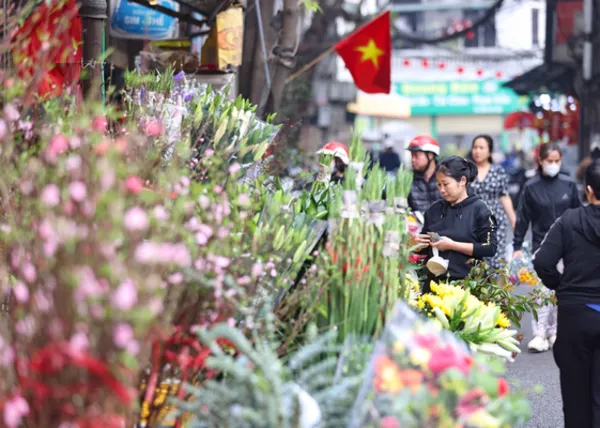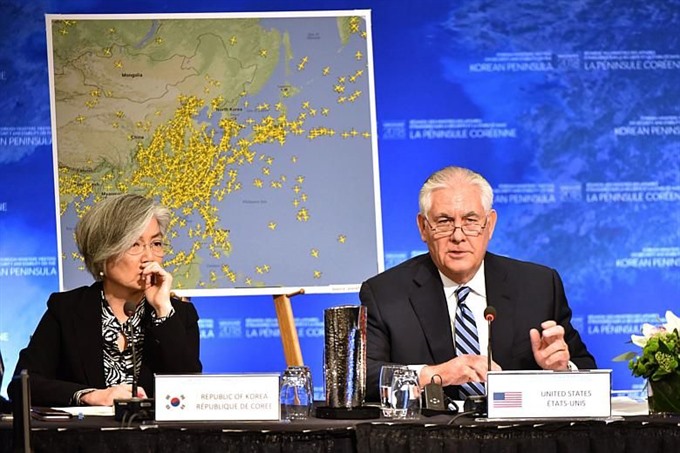 World
World

The United States and 19 of its closest allies agreed on Tuesday on tougher “maritime interdiction” to prevent North Korea from evading nuclear sanctions through smuggling, Secretary of State Rex Tillerson said.
 |
| US Secretary of State Rex Tillerson gives his opening remarks as South Korean Foreign Minister Kang Kyung Wha listens at the Vancouver Foreign Ministers Meeting on Security and Stability on the Korean Peninsula, in Vancouver, Canada on January 16, 2018. — AFP/VNA PHOTO |
VANCOUVER — The United States and 19 of its closest allies agreed on Tuesday on tougher “maritime interdiction” to prevent North Korea from evading nuclear sanctions through smuggling, Secretary of State Rex Tillerson said.
Tillerson, speaking after international talks in Vancouver, said the allies do not want to interfere with legitimate shipping but warned that action must be taken to stop sanctions-busting “ship-to-ship” transfers at sea.
The US urged allies to escalate pressure on North Korea over its nuclear missile programme, despite a cautious tone from key US partner South Korea.
Tillerson was joined by his hawkish Japanese counterpart at 20-nation talks in Vancouver in calling for tougher punitive measures against Pyongyang.
But South Korea, while publicly maintaining faith with US President Donald Trump’s “maximum pressure” campaign, struck a markedly more optimistic tone, arguing that renewed North-South talks show sanctions are already working.
Key players China and Russia were not invited to the meeting of the powers that united under UN command to fight North Korea in the 1950-63 war, and denounced the gathering as a Cold War throwback.
Tillerson, hosting the event with Canada’s foreign minister Chrystia Freeland, called for North Korean ships to be intercepted at sea and for new international measures to be implemented every time Pyongyang tests new weapons.
“First, we all must insist on a full enforcement of UN Security Council sanctions, as this is the letter of the law. We especially urge Russia and China in this matter,” he said.
“Second, we all must work together to improve maritime interdiction operations. We must put an end to illicit ship-to-ship transfers that undermine UN sanctions.
“And, third, there must be new consequences for the regime whenever new aggression occurs.”
He received backing from his Japanese counterpart Taro Kono in public opening remarks, but South Korea’s Kang Kyung-Wha sounded a more cautious note and told the 20 senior envoys that sanctions pressure is already making progress.
Some observers have welcomed North Korea’s decision to meet with Seoul’s representatives and to send a delegation to the South’s upcoming Winter Olympics as a sign that tensions may be lowered.
But Kono urged the allies not to let their guard down as they seek to force Pyongyang to agree to negotiate its own nuclear disarmament.
Without explicitly pointing to South Korea, Kono warned that Kim Jong-Un’s regime “must be intending to drive a wedge between those tough countries and those that are not so tough.”
“I am aware that some people argue that because North Korea is engaging in inter-Korean dialogue, we should reward them by lifting up sanctions or by providing some sort of assistance,” he said.
“Frankly, I think this view is just too naive. I believe that North Korea wants to buy some time to continue their nuclear missile programmes,” he said.
For her part, Kang welcomed international support for the sanctions regime, but her opening remarks in Tuesday’s session carried a more optimistic message than that of her Japanese neighbour.
“I believe that the two tools, tough sanctions and pressure on the one hand and the offer of a different brighter future on the other, have worked hand in hand,” she said.
“Indeed the concerted efforts of the international community has begun to bear fruit,” she explained.
“We should take note that the North has come back to inter-Korean dialogue for its participation in the Winter Games, as evidence and observations accumulate to show that sanctions and pressure are beginning to take effect.”
If the sanctions regime is to survive and eventually force Kim to the table, it will require Russia and especially China to continue to support the measures they agreed to in UN Security Council resolutions.
Moscow and Beijing were not represented in Vancouver and angrily dismissed the talks.
“The most important relevant parties of the Korean peninsula issue haven’t taken part in the meeting so I don’t think the meeting is legal or representative,” Chinese foreign ministry spokesman Lu Kang told a regular briefing.
Lu denounced the “Cold War mentality” of “relevant parties,” without naming the US, which is urging Beijing to cut off fuel oil supplies to Pyongyang to force it to negotiate its own nuclear disarmament.
With China absent from Vancouver, US President Donald Trump spoke with his counterpart Xi Jinping.
According to the White House, the pair expressed hope that a recent resumption in face-to-face talks between North and South Korea “might prompt a change in North Korea’s destructive behavior.”
But Trump also “committed to sustain the United States-led global campaign of maximum pressure to compel North Korea to commit to denuclearization.”
Trans-Pacific tensions have been running high for months, despite the recent return to direct talks between Kim’s regime and Moon Jae-In’s South Korea.
Over the weekend, a false alarm in Hawaii warning of an incoming ballistic missile rattled nerves, and earlier this month, Trump and Kim traded saber-rattling bluster.
As the talks got underway, Pyongyang issued its first response to Trump’s argument that his nuclear arsenal dwarfs the North’s fledgling missile batteries.
Official party newspaper Rodong Sinmun dismissed Trump’s “swaggering” as the “spasm of a lunatic” frightened by North Korea’s power and the “bark of a rabid dog.”
The Vancouver meeting kicked off late Monday with a dinner and several bilateral meetings, before Tuesday’s talks to hammer out next steps in the standoff.
Further bilateral talks between the North and South are scheduled for Wednesday, after the Vancouver meeting.
In New York, UN Secretary-General Antonio Guterres said while he believed war was “avoidable,” peace was far from “guaranteed.” — AFP




